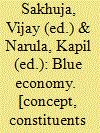|
|
|
Sort Order |
|
|
|
Items / Page
|
|
|
|
|
|
|
| Srl | Item |
| 1 |
ID:
154505


|
|
|
|
|
| Publication |
New Delhi, Pentagon Press, 2017.
|
| Description |
xxiv, 224p.hbk
|
| Standard Number |
9789386618047
|
|
|
|
|
|
|
|
|
|
|
|
Copies: C:1/I:0,R:0,Q:0
Circulation
| Accession# | Call# | Current Location | Status | Policy | Location |
| 059136 | 333.9164150954/SAK 059136 | Main | On Shelf | General | |
|
|
|
|
| 2 |
ID:
186469


|
|
|
|
|
| Summary/Abstract |
Marine energy (i.e., energy from waves, tides, currents) in the United States is a nascent industry. In particular, permitting processes—an uncertainty for industry advancement that can be costly and time consuming to navigate—have rarely been tested and used for marine energy. The novelty of the marine energy industry and utilization of open ocean permitting processes that were not originally developed for marine energy have led to extensive efforts to gain consensus amongst state and federal regulatory agencies to authorize marine energy projects. In 2021, Oregon State University successfully completed permitting of a wave energy test facility, called PacWave South, off the coast of Oregon, which is designed to advance wave energy research and development. This article documents the multi-year process that Oregon State University used to receive federal and state authorization for a pre-permitted commercial-scale grid-connected facility by detailing the development of the test facility, management of uncertainty and challenges, and key decisions. The PacWave South case study provides insights for the larger marine energy community as the industry advances towards commercialization.
|
|
|
|
|
|
|
|
|
|
|
|
|
|
|
|
| 3 |
ID:
128419


|
|
|
|
|
| Publication |
2014.
|
| Summary/Abstract |
To date, academic research relating to Marine Renewable Energy (MRE) has largely focused on resource assessment, technical viability and environmental impact. Experiences from onshore renewable energy tell us that social acceptability is equally critical to project success. However, the specific nature of the marine environment, patterns of resource distribution and governance means experiences from onshore may not be directly applicable to MRE and the marine environment. This paper sets out an agenda for social studies research linked to MRE, identifying key topics for future research: (i) economic impacts; (ii) wealth distribution and community benefits; (iii) communication and knowledge flow; (iv) consultation processes; (v) dealing with uncertainty; (vi) public attitudes; and (vii) planning processes. This agenda is based on the findings of the first workshop of ISSMER, an international research network of social scientists with interests in marine renewable energy. Importantly, this research agenda has been informed by the experiences of developers, regulators and community groups in Orkney. The Orkney archipelago, off the north coast of Scotland, is home to the most intense cluster of MRE research, development and deployment activity in the world today.
|
|
|
|
|
|
|
|
|
|
|
|
|
|
|
|
| 4 |
ID:
101369


|
|
|
|
|
| Publication |
2011.
|
| Summary/Abstract |
In this paper, publicly available cost data are used to calculate the private levelised costs of two marine energy technologies for UK electricity generation: Wave and Tidal Stream power. These estimates are compared to those for ten other electricity generation technologies whose costs were identified by the UK Government (DTI, 2006). Under plausible assumptions for costs and performance, point estimates of the levelised costs of Wave and Tidal Stream generation are £190 and £81/MWh, respectively. Sensitivity analysis shows how these relative private levelised costs calculations are affected by variation in key parameters, specifically the assumed capital costs, fuel costs and the discount rate. We also consider the impact of the introduction of technology-differentiated financial support for renewable energy on the cost competitiveness of Wave and Tidal Stream power. Further, we compare the impact of the current UK government support level to the more generous degree of assistance for marine technologies that is proposed by the Scottish government.
|
|
|
|
|
|
|
|
|
|
|
|
|
|
|
|
|
|
|
|
|